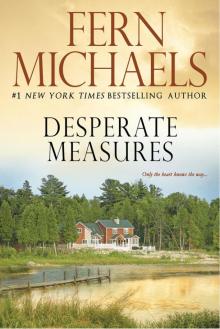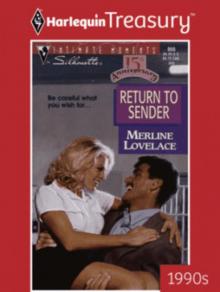- Home
- Fern Michaels
Wishes for Christmas Page 4
Wishes for Christmas Read online
Page 4
Harry smiled. Harry never smiled except when it came to his daughter, Lily. Just saying her name to him made his eyes light up, and he would grin from ear to ear. Then, after the grin, he’d just smile.
“Lily never asks about Cooper. Yoko and I always bring him up and tell her the latest tidbits that Julie shared with us. She just smiles and says, ‘I know, Daddy. I talked to Cooper last night or yesterday or an hour ago.’ Something along those lines. Don’t look at me like that, Jack. Then she’ll tell me something that Julie will tell me two days later. We are never going to figure it out, so let’s quit while we’re ahead, okay?”
“Um . . . yeah, okay, Harry. Damn it, I want to know how they do that. Kid and a dog . . . He got inside my head that last day before she left. I wanna know, Harry. Stop bullshitting me. You want to know, too, and don’t say you don’t.”
Yoko leaned over and whispered, “No, he doesn’t, Jack.”
And that was the end of that.
“Okay, ladies and gentlemen, I cracked the hospital records. Believe it or not, that little rural hospital converted all their files and records to computers fifteen years ago. We are good to go.” To prove his point, Abner raised his hands, cracked his knuckles, then flexed his fingers for a full five minutes before he lowered his hands to the keyboard. “This might take a little while, because I have to go back so many years. If it’s here, I’ll find it.”
Isabelle preened like a queen at the king’s words. This was her man saving the day. That got smiles around the table.
While Abner did what he did best, the others focused on Yoko and Harry and their trip. Mostly, it was about the presents everyone had bought for Lily.
Jack shrugged. “It’s a girly thing,” he said to the others.
“You should see Lily fence. She even beat out the boys’ class. She’s at the top of her age class. Her master said she is one of the best that he’s ever trained. He said he had only one other student who, at the same age, was as advanced as she is,” Harry said, pride ringing in his voice.
“And that student’s name is—drumroll please— one Harry Wong! Like father, like daughter!” Yoko said, clipping Harry alongside the head. Harry actually blushed.
“No kidding!” Dennis said. “Wow. That is awesome. You must be so proud, Harry. The best thing in the whole world is being a good dad, and I think you’re the best. Oops, that’s wrong. I know you’re the best dad in the whole world.”
Harry turned around and gazed at Dennis with a strange look on his face. Dennis started to shake. “Dennis, that is the nicest thing anyone has ever said to me in my entire life. Thank you for saying that.”
All Dennis could do was nod, because he didn’t trust himself to speak. Harry was . . . Harry was . . . Harry was Harry.
“Heads up, everyone! You may applaud now. The wizard of Pinewood has performed once again!” Abner shouted at the top of his lungs.
Everyone clapped. Maggie ran to stand behind Abner to stare down at his computer. The others followed.
“Okay, people, here it is. I’m printing out copies for everyone, but I’ll read to you what her file says. Alma Ann Roland was twenty-four years old when she was admitted to St. Stephen’s Hospital. She was taken into the emergency room. The doctor of record was James Montgomery. The file says she had been brutally attacked. She also suffered a concussion. Probably from a fall on the tile floor. She had head lacerations, a split lip, and a broken nose. She needed sixteen sutures. She also had two cracked ribs. It says here that she put up a fight. She was in the hospital for seven days, then released.
“Her insurance carrier was Blue Cross of North Carolina. The address where she lived at the time is in the file here. It must be an apartment, because it says she lived in two-B. The apartment complex is called Myler Gardens, and Myler Gardens is in Albright, which we know is where the school was located. Roland was discharged and left the hospital on her own. She was given a prescription for painkillers and the name of a well-known counselor and was told to see her own physician the following week. That physician’s name is Hector Morales. That’s all, folks.”
“That’s a lot, actually,” Maggie said. “Now we have a starting point. I’m up for going there tomorrow, if it’s okay with you, Annie.”
“Of course, dear. Whatever it takes. Take Ted, Joseph, and Dennis with you. That way you can all cover quite a bit of ground in the shortest time possible. And now I think our ninety minutes are up, and I’m sure that our dinner is waiting. We can discuss this more after dinner if you like.”
Dinner was a boisterous affair now that the gang had something they could sink their teeth into. To Charles’s chagrin, business, which was never to be discussed at the dinner table, was the main subject of conversation.
Myra looked her husband square in the eyes and defiantly said, “While you were gone, dear, we all voted on a few changes, and talking business at dinner was one of those changes, so grin and bear it.”
Charles grinned because it was an order. Even though he didn’t like the new order, he would have cut out his tongue before he said a word.
“It’s a wise man who knows when to keep his lip zipped, my friend,” Fergus hissed out of the corner of his mouth.
“Amen,” Charles said, the smile still plastered on his face.
Chapter 5
“The sign says MYLER GARDENS—APARTMENTS, so I guess this is the place,” Ted announced as he turned right, then followed a sign that said VISITOR PARKING.
“Looks like any other apartment complex anywhere in the good old U.S. of A. Seventy-five units, tops,” Dennis said as he peered out the window of their airport-obtained rental car.
“The place has been here for awhile, that’s for sure. But it looks to be maintained,” Maggie said as she hopped out of the car and headed for a building that had a small sign by the door that read MANAGEMENT.
A bell tinkled when Maggie opened the door. Two women sat behind desks, one typing on a computer and the other pouring over a ledger of some sort. The ledger reader looked up and asked if she could be of help. She went on to say there were no vacancies, but one would open up, a two-bedroom unit, on March 15. She was a pleasant-looking woman of sixty or so, with fashionable reading glasses.
“Actually, we aren’t here to rent. I’m looking for someone who used to live here around twenty-seven years ago. I know that’s a long time ago, but any help you can give us would be appreciated,” Maggie said.
“Well, that lets me out,” the woman whose name tag said her name was Donna Lyme said cheerfully. “My husband and I took over management twelve years ago, when the owners moved to Florida for the warmer weather.”
Maggie pulled a face. She could feel anxiety start to build. She knew it was a long shot, but she asked, anyway. “Is there anyone living here now who might possibly have been here back then? The woman we’re trying to find is named Alma Roland. She lived in apartment two-B on Magnolia Court.”
Donna Lyme pointed to a map on the wall. “Let’s see. A staff sergeant, a bachelor from the base, lives in two-B now. He’s been here about five years. Ruth Ryder lives in four-B. She’s lived here, like, forever. I think someone once said she and her husband moved here when they got married. It would appear she never left. She is a widow. Her apartment is a three-bedroom. I’d love it if she’d move to one of our one-bedroom units, but she won’t hear of it. Seems she raised two kids here, in that very apartment, and she isn’t leaving. Nice lady, not that I know her that well. We have a nice family mix here.
“In six-B there is a young couple who moved in two years ago. Does that help you? Mrs. Ryder is the only tenant that’s been here forever, like I said. The other units have all turned over since my husband and I took over. I can give you directions to Mrs. Ryder’s apartment building. She’s on the first floor. You can walk from here.”
Maggie copied down the instructions and scooted out the door, which Ted was holding for her. “I hope the lady has a good memory,” Maggie kept saying over and over as they
hurried along a slate walkway, as if the sooner they got to Mrs. Ryder, the more likely she was to remember something.
Espinosa jabbed at the doorbell. They could all hear a musical chime inside. The door was opened by a tall, thin, gray-haired woman wearing an apron.
“My goodness’ sakes, come in, come in. It’s cold out there.”
The little group entered and stood awkwardly in what was a short hallway or foyer that led into a living room. It looked to be a pretty comfortable room, done up in chintz and maple. And it was neat as a pin; nothing was out of place, except maybe a book and a pair of reading glasses on the coffee table. The place smelled wonderfully of cinnamon and vanilla. Maggie’s mouth started to water. She did love sweets.
Maggie rushed to explain why they were there.
“Lord, have mercy. Now, that calls for coffee and some cinnamon buns. Come along, youngsters. We’ll eat in the kitchen. I’m a kitchen person, and I like to sit over a nice cup of coffee to do my talking.”
Mrs. Ryder proved she could multitask as she set up cups and plates and talked about Alma Roland. “She was the sweetest, kindest young person I’ve ever met. Such a shame what happened to her. I remember it like it was yesterday. All of us who lived here back then did what we could to help her, but in the end, it wasn’t enough. She said she had to leave, but she would stay in touch. I think she meant what she said at the time, but she never followed through. That young woman carried such a burden.”
“Tell us what happened and what you remember,” Maggie said, leaning forward so as not to miss a word once they were all seated around the kitchen table.
“To begin with, I and everyone here at the time were surprised when so little coverage was given to the whole thing. But then, that’s the military for you. It was their school where it all took place. By the same token, Alma really didn’t want to talk about it. She was like a zombie. Strangers who didn’t know her the way we did seemed only to focus on her clubfoot and say that was the reason she was attacked. People can be so very cruel to those who have handicaps. Alma was very sensitive about her handicap, even if she didn’t talk about it.
“We all went to see her in the hospital. When I say ‘we,’ I mean three other neighbors who Alma knew, plus myself. We took flowers, books, and candy. She was . . . Today the term would be, I guess, zoned out. After about a half hour, she asked us to leave so she could go to sleep. We did, and we all cried on the way home. She looked so pitiful, lying in that hospital bed. She stayed in the hospital about a week, maybe a day or two longer. She locked herself in her apartment and would open the door only to me because I was taking her food.
“It was so sad. She’d decorated her apartment for Christmas. It looked so pretty and bright and cheerful. She had presents under the tree for me and the neighbors. The decorations on her tree were all made by the children in school. She treasured those because she said innocents had made them. She even had a fresh balsam wreath on her front door. I wanted her to talk about what had happened, not because I was being nosy. I just wanted to help the poor little thing. She was an orphan, you know, no family. She told me once that when she was born, her parents didn’t like that she was deformed, so they threw her away. They just threw that baby away. Who does such a thing? Who?” Mrs. Ryder asked, outrage written all over her face.
Her voice was so choked, Maggie could barely get the words out of her mouth. “What did she tell you happened to her?”
“She said she was one of the last to leave the building that day, and she was returning something to the supply room. She said someone came up behind her, threw a rag over her head, and knocked her around. She had to have a lot of stitches, and they had to shave all her pretty curly hair. That broke my heart to see her half bald. One of the neighbors knitted a hat for her, and she did wear it.”
Maggie felt like she was going to black out any second. She gripped the edge of the table and held on for dear life.
“What else did she say?” Ted asked gruffly, his eyes on Maggie.
“She said one of her students saw her lying on the floor and tried to help her, but all she could say to the little girl was, ‘Go get help.’ She said the child was terrified . . . then something about the bus. Anyway, she said the janitor’s son found her and called for an ambulance. Or his father did. The boy just helped his father at the school when he got home from school. I think he was a senior that year. I don’t know where I heard that, or maybe it was in the paper. That’s pretty much it. Alma simply didn’t want to talk about what happened. Who could blame her? I tried saying all the right things, but while she heard the words, she didn’t hear them, if you know what I mean.”
“When did she leave? You said she left,” Dennis said.
“About two weeks later. She went to two, maybe three counseling sessions and said she wasn’t going back. She said she felt dirty when she left. A few days later, she was gone. She had an old, rickety car, but it did run. She didn’t take any of her furniture or bedding. Just her personal things. She left me a lovely, sweet note, thanking me for trying to help her and for being her friend. I cried for days.”
In a strangled voice, Maggie said, “I was that little girl. I’ve been trying to find Miss Roland for years. I need to find her, Mrs. Ryder. Do you have any idea where she might have gone?”
“Dear Lord, how awful for you. I wish I could help you, but I don’t have any other information to give you. I wish I did.”
“What about her friends? Did she have any? Do you know where she went to college?” Espinosa asked.
“She really didn’t have any friends to speak of, at least that I knew of. The young people around here at the time liked to party. There was no place for a girl with a clubfoot at a party scene. Alma went to Duke University. On a full scholarship. She didn’t have to pay a dime. She worked in the admitting office at Duke to earn spending money. She was so proud of her academic achievements. She told me she graduated second in her class and had a four-point-oh GPA.”
“And they never found the person who attacked Miss Roland?” Espinosa asked.
“No. And let me be the first to tell you they didn’t look very hard, either. I always thought that the janitor or the son did it, but Alma couldn’t identify anyone. Then, when the school term ended, the military closed the school, and the father and his son were out of a job. About a year later, the boy was killed on his motorcycle. There was a big to-do about that in the paper at the time. Drugs and alcohol.” She sniffed. “I don’t know what happened to the father. I guess the police closed the book on all of it.”
Maggie was so sick to her stomach, she wanted to cry. All she could do was stare at the plate of cinnamon buns. She looked down into her coffee cup. She hadn’t tasted anything at all.
“Did Miss Roland ever talk about her clubfoot? By that I mean, did she have to go get fitted for a new shoe from time to time? I’m sorry I’m so ignorant on that subject. How does it work? Do you know?” Ted asked.
Mrs. Ryder frowned. “Now that you mention it, yes, she did go somewhere. Let me think.” The frown deepened. “I can’t absolutely swear to it, but I think there were two places where Alma went. One, I know for sure, was in Spring Lake, on Bragg Boulevard. I want to say they went out of business, but it might be the other one that closed. The other shop or clinic, whatever it was, was in Fayetteville. And I am virtually certain that one of the two of them closed down. There had been something wrong with the last fitting, and Alma had terrible blisters. She said the shoe felt extra heavy, something about inferior leather. I don’t know the name of either place. I’m sorry. I’m sure the one that is still there is in the Yellow Pages. Maybe they would know something about the one that closed down.”
Maggie knew that was all they were going to get. She stood up, anxious to head to either place to see what else they could find out. “Thank you so much for your help, Mrs. Ryder. If we locate Miss Roland, I’ll ask her to call you.” She handed over one of her business cards, then scribbled her cell phone numbe
r on the back. “Please, if you think of anything, call me, even if it’s the middle of the night.” Mrs. Ryder said she would do that.
Mrs. Ryder swiped at the corner of her eye. “If you find Alma, tell her I have all her Christmas decorations. I packed up what she left behind. I thought she might come back for them someday. Wouldn’t it be nice if she showed up at Christmastime? Now, that would be what I call a Christmas miracle.”
Maggie sniffed and tried not to cry. “That’s what I would call it, too,” she said in a soft whisper.
“We’re going to find her, Maggie,” Dennis said once they had all stepped outside. “I promise.”
“Okay, Dennis. That’s good enough for me.”
Mrs. Ryder waved from her doorway. As an afterthought, she called out, “I know it’s way too early, but Merry Christmas.”
It didn’t take long to discover that the Bootery, the shoe clinic Alma Roland had used in Spring Lake during that time, had gone out of business. A discount cosmetic emporium was located where the Bootery used to be. All thanks to Dennis and his magic fingers and social media.
“We might as well head to Fayetteville. Find us an address, Dennis,” Ted said as he pulled into traffic.
“There is only one place that might, I say might, be what we’re looking for. It’s called Step & Step. It says it caters to proper shoe fitting and everything is custom made and they use only the finest leather.” Dennis rattled off an address, which Espinosa fed into the GPS system.
“Twenty-seven years is a long time to keep records,” Maggie grumbled. “I’m not feeling hopeful here.”
“Stop being so negative,” Dennis said. “Look. They’re hanging Christmas lights up ahead. I bet it’s a pretty town during the holidays, with all the colored lights.” If he thought that was going to cheer Maggie up, he was dead wrong. He could see that her eyes were leaking. Like a little kid, she bent over and wiped her eyes on the sleeve of her jacket as the robotic voice of the GPS instructed Ted where to turn. He wished there was something he could do or say to make Maggie feel better, but his heart and his gut warned him to leave well enough alone.

 Safe and Sound
Safe and Sound Santa Cruise
Santa Cruise Deep Harbor
Deep Harbor Truth and Justice
Truth and Justice Far and Away
Far and Away The Christmas Stocking
The Christmas Stocking 18. Cross Roads
18. Cross Roads Texas Sunrise
Texas Sunrise Take Down (The Men of the Sisterhood)
Take Down (The Men of the Sisterhood) Sleigh Bells
Sleigh Bells A Golden Tree
A Golden Tree About Face
About Face To Taste The Wine
To Taste The Wine Texas Rich
Texas Rich 15. Vanishing Act
15. Vanishing Act To Have and to Hold
To Have and to Hold Eyes Only
Eyes Only Fearless
Fearless 5. Sweet Revenge
5. Sweet Revenge A Season to Celebrate
A Season to Celebrate Cut and Run
Cut and Run 8. Hide and Seek
8. Hide and Seek A Snowy Little Christmas
A Snowy Little Christmas Hidden
Hidden Sins of the Flesh
Sins of the Flesh 3. Vendetta
3. Vendetta Desperate Measures
Desperate Measures No Way Out
No Way Out Late Edition
Late Edition 11. Collateral Damage
11. Collateral Damage Texas Heat
Texas Heat Forget Me Not
Forget Me Not 4. The Jury
4. The Jury 16. Deadly Deals
16. Deadly Deals Plain Jane
Plain Jane Crown Jewel
Crown Jewel Sweet Vengeance
Sweet Vengeance 19. Deja Vu
19. Deja Vu Point Blank
Point Blank Truth or Dare
Truth or Dare Family Blessings (Cisco Family)
Family Blessings (Cisco Family) Classified
Classified The Blossom Sisters
The Blossom Sisters Spirited Away
Spirited Away Wishes for Christmas
Wishes for Christmas What You Wish For
What You Wish For Fancy Dancer
Fancy Dancer 14. Razor Sharp
14. Razor Sharp I'll Be Home for Christmas
I'll Be Home for Christmas Vegas Sunrise
Vegas Sunrise Trading Places
Trading Places Charming Lily
Charming Lily Cross Roads
Cross Roads Balancing Act
Balancing Act Cinders to Satin
Cinders to Satin A Family Affair
A Family Affair A Winter Wonderland
A Winter Wonderland 17. Game Over
17. Game Over Hokus Pokus (The Sisterhood: Rules of the Game, Book 2)
Hokus Pokus (The Sisterhood: Rules of the Game, Book 2) Picture Perfect
Picture Perfect Dear Emily
Dear Emily 9. Hokus Pokus
9. Hokus Pokus Cross Roads - Sisterhood book 18
Cross Roads - Sisterhood book 18 Blindsided
Blindsided Fast Track
Fast Track Hey, Good Looking
Hey, Good Looking Kentucky Heat
Kentucky Heat Yesterday
Yesterday Weekend Warriors
Weekend Warriors Coming Home for Christmas
Coming Home for Christmas Vanishing Act
Vanishing Act Gotcha!
Gotcha! Home Free
Home Free Fast Track (The Sisterhood: Rules of the Game, Book 3)
Fast Track (The Sisterhood: Rules of the Game, Book 3) Holly and Ivy
Holly and Ivy Fool Me Once
Fool Me Once The Most Wonderful Time
The Most Wonderful Time Exclusive
Exclusive Jingle All the Way
Jingle All the Way Vendetta
Vendetta Kentucky Rich
Kentucky Rich Lethal Justice
Lethal Justice The Future Scrolls
The Future Scrolls Deja Vu
Deja Vu Getaway
Getaway Mistletoe Magic
Mistletoe Magic Seasons of Her Life
Seasons of Her Life When the Snow Falls
When the Snow Falls Breaking News
Breaking News 2. Payback
2. Payback Under the Radar
Under the Radar Serendipity
Serendipity High Stakes
High Stakes Need to Know
Need to Know Captive Innocence
Captive Innocence Countdown
Countdown Return to Sender
Return to Sender Fast and Loose
Fast and Loose Sara's Song
Sara's Song Razor Sharp
Razor Sharp 6. Lethal Justice
6. Lethal Justice Hokus Pokus
Hokus Pokus 13. Under the Radar
13. Under the Radar 7. Free Fall
7. Free Fall Collateral Damage
Collateral Damage Whitefire
Whitefire Upside Down
Upside Down Southern Comfort
Southern Comfort Celebration
Celebration 1. Weekend Warriors
1. Weekend Warriors 10. Fast Track
10. Fast Track Making Spirits Bright
Making Spirits Bright Silver Bells
Silver Bells Holiday Magic
Holiday Magic Christmas At Timberwoods
Christmas At Timberwoods Captive Embraces
Captive Embraces Winter Wishes
Winter Wishes Listen To Your Heart
Listen To Your Heart Kentucky Sunrise
Kentucky Sunrise Tuesday's Child
Tuesday's Child Final Justice
Final Justice Free Fall
Free Fall No Safe Secret
No Safe Secret Deadly Deals
Deadly Deals Wish List
Wish List Pretty Woman
Pretty Woman Payback
Payback Mr. And Miss Anonymous
Mr. And Miss Anonymous The Scoop
The Scoop In Plain Sight
In Plain Sight The Nosy Neighbor
The Nosy Neighbor Final Justice: Sisterhood Series #5
Final Justice: Sisterhood Series #5 Sins of Omission
Sins of Omission The Jury
The Jury Captive Secrets
Captive Secrets Hide and Seek (The Sisterhood: Rules of the Game, Book 1)
Hide and Seek (The Sisterhood: Rules of the Game, Book 1) Crash And Burn
Crash And Burn Sweet Revenge
Sweet Revenge Secret Santa
Secret Santa 20. Home Free
20. Home Free Game Over
Game Over For All Their Lives
For All Their Lives 12. Final Justice
12. Final Justice Hideaway
Hideaway Perfect Match
Perfect Match